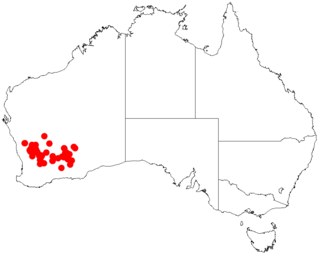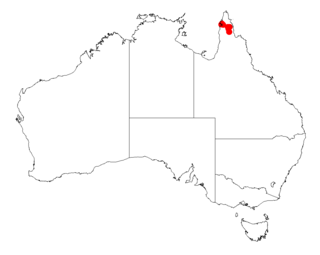
Acacia gibbosa is a shrub or tree belonging to the genus Acacia and the subgenus Juliflorae native to Western Australia.
Acacia incongesta, also known as Peak Charles wattle, is a shrub belonging to the genus Acacia and the subgenus Juliflorae that is endemic to a small area in south western Australia

Acacia jibberdingensis, also known as Jibberding wattle or willow-leafed wattle, is a shrub or tree belonging to the genus Acacia and the subgenus Juliflorae that is endemic to Western Australia.

Acacia oncinocarpa is a shrub or tree belonging to the genus Acacia and the subgenus Juliflorae that is endemic to northern Australia.

Acacia oncinophylla, commonly known as hook-leaved acacia, is a shrub belonging to the genus Acacia and the subgenus Juliflorae.

Acacia resinimarginea is a tree or shrub belonging to the genus Acacia and the subgenus Juliflorae that is endemic to western Australia.

Acacia sibina is a tree or shrub belonging to the genus Acacia and the subgenus Juliflorae the is endemic to parts of western Australia.

Acacia hystrix is a shrub belonging to the genus Acacia and the subgenus Phyllodineae that is endemic to south western Australia.

Acacia eremaea is a shrub or tree of the genus Acacia and the subgenus Plurinerves that is endemic to an area in western Australia.

Acacia inceana is a shrub or tree of the genus Acacia and the subgenus Plurinerves that is endemic to south western Australia.

Acacia juncifolia, commonly known as rush-leaf wattle, is a shrub or tree belonging to the genus Acacia and the subgenus Phyllodineae that is endemic to north eastern Australia.

Acacia obtusata, commonly known as blunt-leaf wattle or obtuse wattle, is a tree or shrub belonging to the genus Acacia and the subgenus Phyllodineae native to eastern Australia.

Acacia pedina is a tree or shrub belonging to the genus Acacia and the subgenus Phyllodineae native to eastern Australia.

Acacia semilunata is a shrub or tree belonging to the genus Acacia and the subgenus Phyllodineae native to north eastern Australia.

Acacia semirigida, also known as stony ridge wattle, is a shrub or tree belonging to the genus Acacia and the subgenus Phyllodineae native to north eastern Australia.

Acacia cretata is a shrub or tree belonging to the genus Acacia and the subgenus Juliflorae that is native to north eastern Australia.

Acacia leptostachya, commonly known as Townsville wattle or slender wattle, is a shrub or small tree belonging to the genus Acacia and the subgenus Juliflorae that is native to north eastern Australia.

Acacia striatifolia is a shrub or tree belonging to the genus Acacia and the subgenus Juliflorae that is native to north eastern Australia.

Acacia tenuinervis is a shrub or tree belonging to the genus Acacia and the subgenus Juliflorae that is native to north eastern Australia.

Acacia ommatosperma is a shrub of the genus Acacia and the subgenus Plurinerves that is endemic to an area of north western Australia.



















